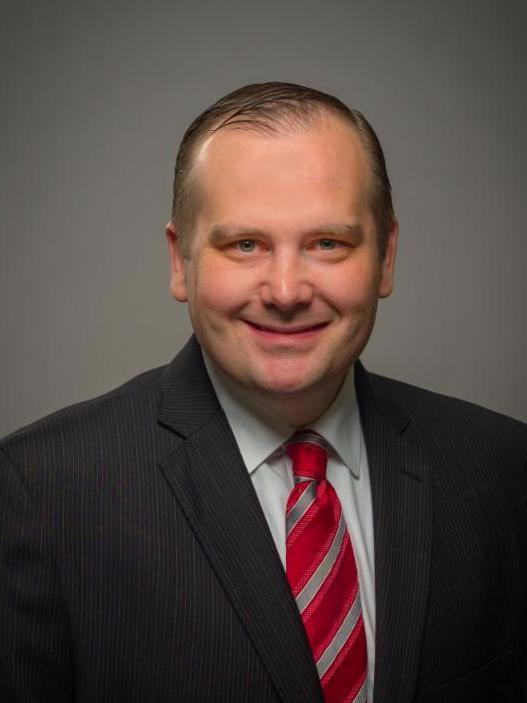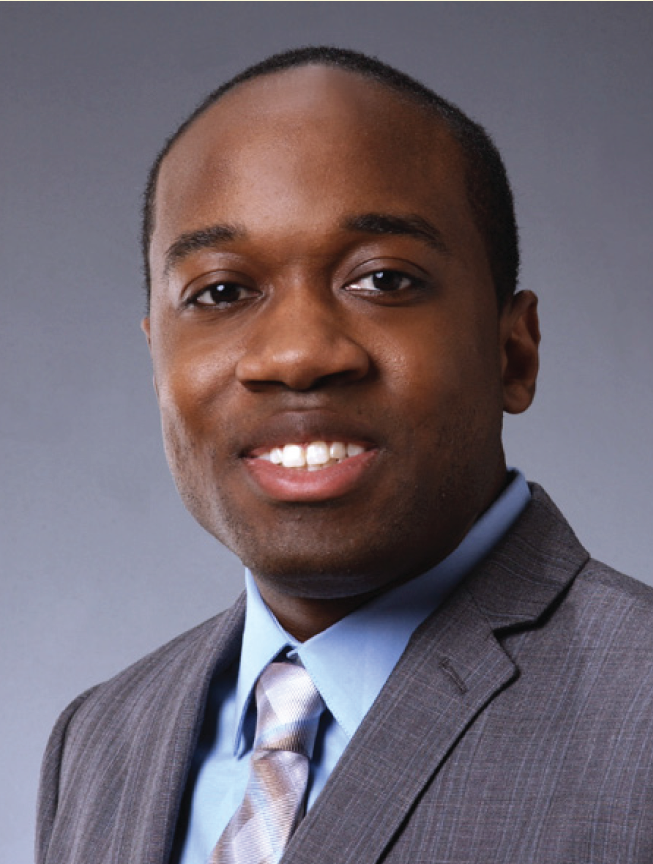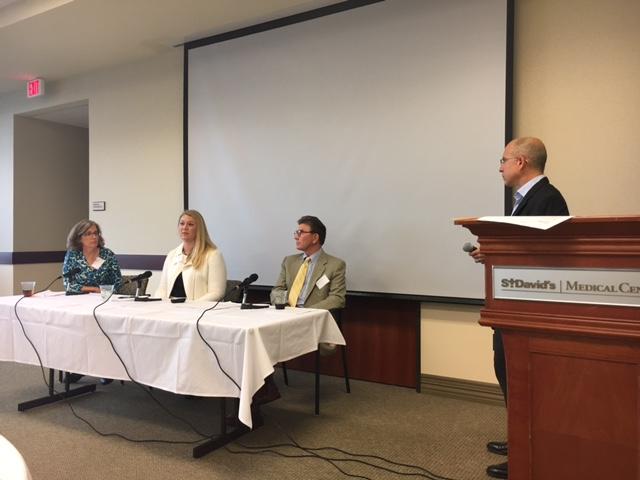 |
|
|
|
ACHE/HFMA Summer Institute
Friday, Aug. 25, 2017
More info coming soon!
ACHE Social Event
Wednesday, Oct. 11th
More info coming soon!
ACHE Central & South Texas Fall Collaborative
Friday, Nov. 3, 2017
More info coming soon!
|
2017 Central Texas
Board of Directors
|
Michael Nowicki, EdD,
FACHE, FHFMA
Regent
Amanda Frye, MHA
Past President
Eric Weaver, DHA, FACHE
President
David Perez, MBA
President Elect
Beth Booher, MHA, FACHE
Secretary/Treasurer
Richard Sanchez, MHA
Director of Communications
Dante Ridgell, MHA
Director of Membership
Jennifer Greenway, MHA, FACHE
Director of Program Development
Lacy Ware, MHA
Director of Local Program Council
Deborah Munhoz, MS, PCC
Director of Sponsorships
Maria Serafine, MHA
Director of Networking & Social Events
|
|
New Members
April
Col Sharette K. Gray, MD, Fort Hood
Mitchell G. Berg, Austin
Stephen Boulware, Austin
Wayne D. Carter, Sr., Austin
May
Andrea Dake-Mendez, Moody
Christine M. Baskerville, Harker Heights
Col James B. Lucas, II, MD, Fort Hood
Jim Little, Lago Vita
Joan Ingram, MD, Fort Hood
Jon Calvin, CPA, Georgetown
Keisha B. Grant, Temple
Kelley Rodarte, Fort Hood
Krista Elliott, Killeen
Kristine Wood, Cedar Park
Stephanie Hobson, Austin
Tracie Duckett-Stephens, Fort Hood
June
Ann-Marie Price, Round Rock
Joe L. Romer,o Austin
Parker Pridgen, San Marcos
New Fellows
June
Amanda Richter, FACHE, Killeen
|
Forum on Advances in Healthcare Management Research 2018 Proposals Open
|
The American College of Healthcare Executives would like to invite authors to submit proposals to present their research at the 10th annual Forum on Advances in Healthcare Management Research. This session will take place during ACHE's 2018 Congress on Healthcare Leadership, March 26-29. The senior author of each selected proposal will receive a complimentary registration to the Congress. Please visit
ache.org/Congress/ForumRFP.cfm
for the selection criteria and submission instructions. Submit your up-to-400-word abstract by July 10.
|
The Thomas C. Dolan Executive Diversity Program is Now Accepting Applicants
|
Please help us spread the word about the open application period for the 2018 Thomas C. Dolan Executive Diversity Program (ache.org/ExecutiveDiversity).
During this year-long program, scholars benefit from specialized curriculum opportunities to develop strategies for successful navigation of potential career challenges and enhance executive presence, one-on-one interaction with a specially selected mentor, and participation in formal leadership education and career assessments. Enhanced self-awareness, critical leadership skills, and an expanded network of leaders will help prepare scholars to ascend to C-suite roles in hospitals, health systems and other healthcare organizations.
Visit ache.org/ExecutiveDiversity for more information or to apply. If you have questions about the program, please contact Cie Armstead, director, Diversity and Inclusion, ACHE, at
[email protected]
or (312) 424-9306.
|
Save time and money with ACHE self-study program
|
Need to earn ACHE Qualified Education credits? Earn six hours by completing a course through ACHE's Self-Study Program. Self-Study courses are portable and ready for you anytime-at home, in the office, and more. Topics include finance, human resources, leadership and management. Take advantage of ACHE's special offer: purchase one self-study course and receive a second course at 50 percent off. To review a list of available courses and corresponding Health Administration Press books and to place an order, visit
the ACHE website.
|
Tapping Community Physicians for Innovation Ideas
|
Community physicians who work outside major medical centers represent a wealth of expertise that could guide innovation efforts, if mobilized, according to Adam O. Kadlec, MD, a board-certified urologist at Western Michigan Urological Associates. Kadlec provided tips to help inspire community physicians to get more involved in a recent blog for NEJM Catalyst.
Learn the process
. "Many physicians are simply unaware that innovation is a process and that entrepreneurship is a discipline ... Teaching community clinicians that there is a process-and that they can play a part-is the first step toward engagement," wrote Kadlec.
Look for meaningful partnerships
. Many major healthcare and academic medical centers have launched innovation hubs in recent years. Community clinicians should be intentional about finding opportunities for innovation, and that may mean creating partnerships where innovation is already underway.
Network with like-minded physicians
. Physicians who don't have access to major medical innovation hubs can check out virtual opportunities, like online matching programs, and conferences, such as Medicine X and TEDMED, to network with other passionate clinicians.
|
Four New Governors Elected to ACHE Board
|
-CHICAGO, March 25, 2017
Four healthcare leaders have been elected to serve on the Board of Governors of the American College of Healthcare Executives: Anthony A. Armada, FACHE; Nancy M. DiLiegro, PhD, FACHE; Sara M. Johnson, FACHE; and Edmund L. Lafer, MD, FACHE. They took office today at the Council of Regents Meeting preceding ACHE's 60th Congress on Healthcare Leadership. The new Governors will serve a three-year term representing ACHE members on ACHE's Board of Governors, the authority that oversees ACHE operations and member services. All are board certified in healthcare management as ACHE Fellows.
|
ACHE Installs 28 New Regents, Appoints two Regents-at-Large and Two Interim Regints
|
-CHICAGO, March 25, 2017
Twenty-eight healthcare executives have been elected to serve three-year terms as Regents, and two have been appointed to serve as Regents-at-Large for the American College of Healthcare Executives. The Regents took office today at the Council of Regents Meeting preceding ACHE's 60th Congress on Healthcare Leadership.
In addition, two Regents recently were appointed to represent members on an interim basis in Colorado and New Hampshire.
The elected Regents will represent ACHE members in their respective jurisdictions; Interim Regents serve until the next election can be held. All individuals are board certified in healthcare management as ACHE Fellows.
|
|
|
Central Texas ACHE Job Bank
|
|
| |
If you would like to post a job opportunity, please contact
Richard Sanchez.
|
|
 |
|
 |
|
Michael Nowicki, EdD, FACHE, FHFMA
Welcome to summer and a time to catch up, at least for me. First, let me congratulate two of our local affiliates who have been recognized for national ACHE service. Cristian Lieneck is finishing his term as Chairman of the AUPHA/HAP Editorial Board for Undergraduate Studies, and David Rubenstein is starting his term as Chairman of the Voluntary Giving Committee. Please join me in congratulating both Cristian and David. During a recent board meeting of the South Texas Chapter, I asked David how we could help him in his new role: make an annual donation to The Fund for Innovations in Healthcare Leadership.
I will start setting up visits to the seven universities that maintain programs in healthcare administration and are recognized as such in the Higher Education Network (HEN) of ACHE. During these annual visits...
Click here to read more
|
|
Eric Weaver, DHA, FACHE

Dear Chapter Members,
Greetings! I hope everyone is having a great summer so far and enjoying some free time with family and friends when possible. Our chapter remains committed to serving its members, and I hope you find this newsletter (and our new website!) invaluable resources to connect with Central Texas ACHE Chapter.
As I reflect on my message for this newsletter, I thought I'd share a few thoughts
on service which extends beyond the impact we make in our day-to-day executive leadership roles.
- Service to the Profession. Once again, we are in the midst of a heated healthcare policy debate in our country. As healthcare executives, we are all aware that today's health care system is in trouble and that regulatory pressures will continue to mount. Central Texas ACHE chapter will continue to bring forth relevant education events that will keep you knowledgeable about what is coming your way.
2. Service
to the Next Generation. Central Texas ACHE is committed to its younger members that range from current HA students to early careerists. I would also... Click here to read more
|
|
Richard Sanchez, MHA
Announcing the Launch of our new website!
After several months of hard work and dedication, I am happy to officially announce the launch of our new website effective Friday, June 30, 2017. You can find us at https://achectx.org.
Our goal is to provide our chapter members with an easier way to stay connected with the various educational and networking opportunities our chapter and Local Program Council offers.
The updated site contains an integrated social media button for Facebook and includes changes to navigation with dropdown menus for both mobile and desktop versions.
We hope you find the new website with a fresh look, easy to navigate and an invaluable resource.
For any questions, suggestions or feedback, please E-mail us.
Thank you,
Richard Sanchez, MHA
Director of Communications
Jace Wann
Website Chair |
|
Dante Ridgell, MHA, LSSBB, CPHQ

Dear Members of ACHE Central Texas:
I hope the first half of your 2017 has been well! We have added a total of 28 new members since January. Please take time to welcome our new members. Also, congratulate those who recently passed the Board of Governors exam and those who are re-certified Fellows.
As we work to continuously improve our Chapter, I encourage and challenge each member to do two things:
1. Get More Engaged: While we do have a highly active chapter, each of us can do even more to make us even better.
- Attend at least 1 chapter event in this next quarter.
- Volunteer as a panel member, speaker, or host of an event.
- Send feedback to your Chapter leaders with your thoughts - they are always welcomed.
2. Get Others Involved: As the old saying goes "The more the merrier!"
- Invite your colleagues and coworkers to our Networking and Educational events.
- Tell them about the benefits of joining ACHE and our chapter.
- Reach out to the Chapter leaders if you need talking points.
- Or better yet, bring them to an event and introduce them to your fellow members and Chapter leaders.
I look forward to networking and growing professionally with all of you. Please let me or any of the Chapter leaders know if there is more we can do to make this Chapter better for you.
|
|
|
CTACHE Education Programs
|
|
|
Listening to Employers - How Health Systems Can Support Population Health

On Thursday, April 20th, the Central Texas Chapter of the American College of Healthcare Executives (ACHE) and the National Forum for Latino Healthcare Executives (NFLHE) hosted the continuing education event, "Listening to Employers: How Populations Can Support Population Health". Tre McCalister, EdD, Central Market Region Leader, Mercer Total Health Management Consulting presented, "How Employers are Helping to Drive Healthcare Transformation and Population Health Improvement." A panel discussion followed, featuring Ed Bernacki, MD, MPH, Executive Director, Dell Medical School Healthcare Solutions, Sara Taylor, Director, Seton Health Alliance and Nancy Butterfield, Benefits Manager and was moderated by Ed Melendez, MBA, Principal, TMO Consulting.
Kicking off the population health management discussion, Tre' introduced the Mercer Quality Improvement Collaborative to the audience. In this initiative, Mercer is partnering with employers to target excessive... Click Here to Read More.
|
Resources to Help You Develop Your Value Proposition
If you want to thrive in today's competitive healthcare marketplace, it's important to know the value you bring to the table. ACHE's Competency Self-Assessment Tool will help you reflect on your level of expertise in critical areas of healthcare management to begin developing your value proposition as a healthcare leader. It is equally critical for you to be able to identify the marketplace needs so you can align your skills accordingly as you grow professionally. To help you get started in your research, ACHE's white paper
What Healthcare Leaders Should Know About Recruiting Senior Executives reveals top industry trends and the most in demand skills for healthcare leaders as reported by executive recruiters. You can use these complimentary tools to help you determine the gaps in your skill set and create a professional development plan to fill them.
|
6 Tips for Working with a Poor Team Player
Working with someone who isn't a team player is not just frustrating, it can also negatively affect an entire group's performance, according to a recent Harvard Business Review article. Susan David, founder of the Harvard/McLean Institute of Coaching, and Allan Cohen, a professor of management at Babson College, provided the following strategies for working with someone who isn't a team player.
1. Avoid making assumptions. It may seem natural to jump to conclusions about the reasons behind someone's actions but, the truth is, you never really know why people do the things they do. Instead of assuming someone is a slacker or has a bad attitude, explore first.
2. Be open to talking. Rather than making accusations, ask friendly questions. Working with someone who isn't a team player is an opportunity to practice your leadership skills and gain others' perspectives.
3. Promote friendly group relations. Problems can arise when team members turn on a colleague who isn't pulling their weight. To foster cohesion and discourage ostracization, consider taking your colleague out to coffee or lunch with a few teammates.
4. Focus on the team's shared mission. When working with a poor team player, leaders should take the opportunity to "have a conversation with the entire team about what the group's shared vision should be and the best methods for getting there," according to David.
5. Define duties and deadlines. Sometimes, people who seem like poor team players are simply confused about what their role entails. Take time to review your expectations and your colleague's responsibilities, which eliminates ambiguity.
6. Play to your colleague's strengths. "People are highly motivated by not wanting to let their teammates down," says Cohen. "Get them into the game, and they'll go to great lengths to perform better for the team."
|
Hospital CEO Turnover Rate Remains Steady
CHICAGO, March 19, 2017
For the third straight year hospital CEO turnover held steady at 18 percent, according to a recent report by the American College of Healthcare Executives. While less than the record high of 20 percent in 2013, the level of turnover registered in 2016 is equal to that reported in the previous two years and remains among the highest rates calculated in the last two decades.
"Our data indicate that the elevated CEO turnover rates over the past several years have become the norm," says Deborah J. Bowen, FACHE, CAE, ACHE's president and CEO. "The ongoing consolidation of healthcare organizations, continuing movement toward new models of care and retiring leaders from the baby boomer era may all be influencing these turnover rates. This rate of change in hospital and health system senior leadership teams underscores the importance of those organizations having succession plans to successfully manage C-suite changes," adds Bowen. "Succession planning...
Click here to read more
|
Survey: Healthcare Finance, Safety and Quality Cited by CEOs as Top Issues Confronting Hospitals in 2016
CHICAGO, January 31, 2017
Financial challenges again ranked No. 1 on the list of hospital CEOs' top concerns in 2016, according to the American College of Healthcare Executives' annual survey of top issues confronting hospitals. Governmental mandates ranked second, closely followed by patient safety and quality.
"While financial concerns remain the top issue for CEOs, the survey results indicate that hospitals continue to have great interest in regulatory environment and are maintaining a consistent focus on improving patient safety and the quality of care," says Deborah J. Bowen, FACHE, CAE, president and CEO of ACHE. "Hospital leaders have been faced with an enormous challenge over the last number of years to put in place new strategies to meet a...
Click here to read more!
|
|
|
 |